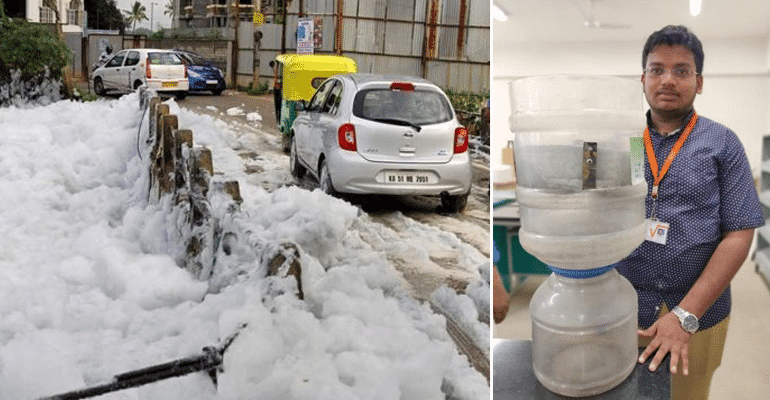Looks like nature has solutions to all our problems. Thanks to a student in Bengaluru who has found a unique method to reduce the toxic froth in Bengaluru’s water bodies.
A second-year Aeronautical Engineering student, Pavan Reddy is a student of MVJ College of Engineering, who has created a filter made of banana, citrus fruits, pineapple, and watermelon peels.

How the filter works
The main causes of froth in the city’s water bodies are mainly due to effluents like fluoride and phosphate, which are found in cleaning agents.
Before using it in the lakes, the peels are dried, powdered and are treated with 1N Hydrochloric Acid to activate them, then the effluents pass at a higher gradient, separating from water.
“The peels are placed one above the other in a filter formation separated at a small distance between each other so that the water flows through the peels. Contaminated water or the effluent passes through the filter from a higher gradient,” he said.
Pavan claims that this method manages to filter out the chemicals with an accuracy of 90 percent. His initiative works on the principle of sedimentation and the fruit peel bed made of fibre is created with a cost of Rs.3,000 per square meter.
In an interview with Indian Express, Pavan says, “Industries around water bodies use halides, especially fluorides, and some volatile compounds during the manufacturing stage and release the ruminant effluents through the sewage to these water bodies, which later causes frothiness in the lake and presence of some volatile compounds cause fire.”
The research was started in April 2018 and the model was developed by June. Pawan’s project was also tested briefly for effectiveness.
Initially, Pavan did the experiment using samples from Bellandur lake and passed it through his fruit peels filter and later checked the results in the laboratory. The model costed him around Rs.2,000 with a further Rs.1,500 spent on the initial stages of testing, mentioned the report.

